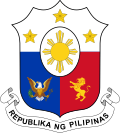| 7th Congress of the Philippines | |||||
|---|---|---|---|---|---|
| |||||
 | |||||
| Overview | |||||
| Term | January 26, 1970 – January 17, 1973 | ||||
| President | Ferdinand Marcos | ||||
| Vice President | Fernando Lopez | ||||
| Senate | |||||
| Members | 24 | ||||
| President | Gil Puyat | ||||
| President pro tempore | Jose Roy | ||||
| Majority leader | Arturo Tolentino | ||||
| Minority leader | Gerardo Roxas | ||||
| House of Representatives | |||||
| Members | 110 | ||||
| Speaker |
| ||||
| Speaker pro tempore | Jose M. Aldeguer | ||||
| Majority leader | Marcelino Veloso | ||||
| Minority leader |
| ||||
 |
|---|
The 7th Congress of the Philippines (Filipino : Ikapitong Kongreso ng Pilipinas), composed of the Philippine Senate and House of Representatives, met from January 26, 1970, until January 17, 1973, during the fifth, sixth, and seventh years of Ferdinand Marcos's presidency.
Contents
- Sessions
- Legislation
- Leadership
- Senate
- House of Representatives
- Members
- Senate 2
- House of Representatives 2
- See also
- Notes
- References
- Further reading
- External links
On September 23, 1972, President Marcos announced to the public that he declared martial law two days prior. Following this, the Congress remained adjourned until it was formally abolished with the ratification of the 1973 Constitution on January 17, 1973. Marcos then exercised legislative powers. In 1976, Congress was replaced by the Batasang Bayan as the Philippines' legislative body until 1978, when it was replaced by the Batasang Pambansa.
One-third of the Senate and the entire membership of the House of Representatives was replaced after the 1969 general elections. The House members and another third of the Senate membership were again replaced after the midterm senatorial elections of 1971.






